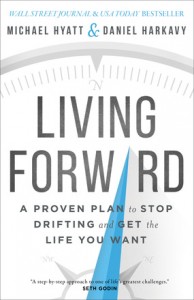Sometimes we just drift through life, responding to daily urgencies without any clear sense of where we are going. Of course, there are seasons when this is necessary. When there is a new baby, when someone is seriously ill, when a loved one temporarily becomes over-busy, during a move, or during other demanding situations, our goal is simply survival.
But Hyatt and Harkavy point out that, in general, we should try to avoid drifting. It is a dangerous way to live, for we may drift into in places and situations we would not have chosen if we had bothered to think about them. In fact, in some sense mindless drifting is one of our major enemies—tomorrow I will read my Bible, pray, smile at my husband, talk to my kids, call that ill person, forgive that one who hurt me, find a way to serve—and suddenly it is too late. Rather, Living Forward helps us be both thoughtful and practical about living our lives the way Jesus wants us to.
Here’s how Hyatt and Harkovy suggest we go about it: Think about what you want said about you at your funeral. Then think about how you can work towards that in small daily actions.
In terms of homeschooling we could also ask: Think about what we want said at our children’s graduation, what we want them to value, to know, and to remember. Then discern how to work towards that in small daily actions.
For teens and young adults who are facing the major decisions of their lives, it can be especially helpful to look ahead and consider where their decisions could lead them.
The authors suggest that this should be a serious and dedicated time of pondering. In fact, they encourage readers to take a whole day to work through these concepts. First there is the dreaming, then the goal setting, and then the planning for concrete action in our daily lives. Practically, the most important step may well be remembering it all. This requires writing our thoughts down, reviewing them regularly (daily at first, then weekly, with more intense reviews quarterly and annually), and acting on them moment by moment.
I read Living Forward months ago when, struggling with personal illness and overwhelmed with caring for loved ones, I was acutely aware of the importance of investing my time wisely. I spent some careful time thinking about the roles and goals of my life, pondering what I was doing (or not doing) to meet those goals, and deciding what I could do to serve God better in my different roles. It helped me be balanced and not forget too many important things during a time when the urgent seemed so overwhelming. Now that life is settling down, it is helping me be thoughtful about how I invest my time.
Note that some Christians speak about ‘letting go and letting God’ and in some ways that is important and valuable; we do not want to idolize a goal or a process, and need to trust God rather than trying to manage our own lives. In other ways, however, that attitude can lead us to apathetic laziness instead of actively loving the Lord our God with all our hearts, all our minds, and all our strength, and our neighbor as ourselves. Serving God requires all our energy as well as our trust and acceptance of what he sends. It can be a tricky balance.
I encourage you to think carefully about your life, to consider how to “number our days so we may gain a heart of wisdom.” (Psalm 90: 1,2)
I suggest reading this book and then also studying David Allen’s Getting Things Done for nitty gritty details on meeting goals. Living Forward is beginning with the end in mind, Getting Things Done is beginning with the mess you’re in, and both are invaluable. The combination is dynamite.
For the ultimate guide to living wisely, read your Bible. You can read applications of its advice for living on Michael Hyatt’s blog. Daniel Harkavy’s website, Building Champions, is helpful as well.
—
For more encouragement see Raising Homemakers, Titus 2 Tuesday, Tell it to Me Tuesday, Finishing Strong, and Trivium Tuesdays.
Disclosure: I received a review copy from Graf Martin and Baker Books and, as usual, am not compensated for this review.

